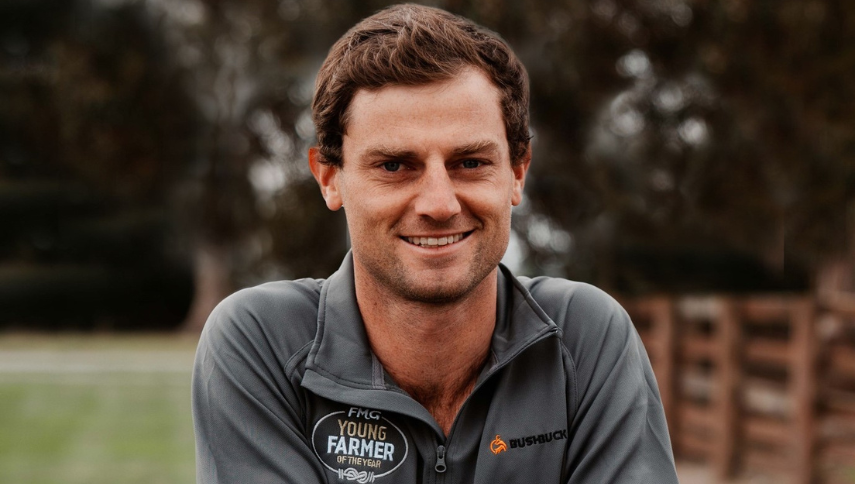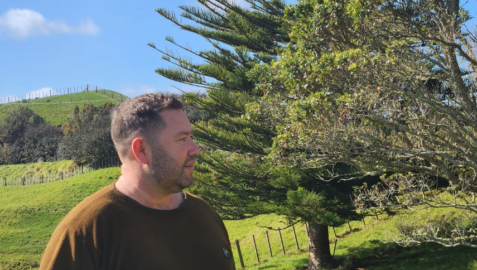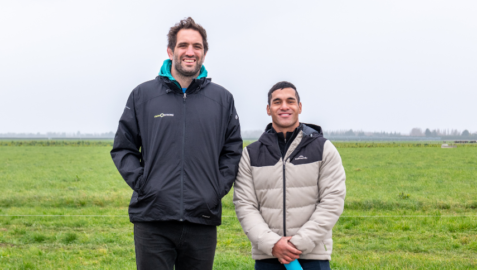
Get on and do
Module Overview
Hawkes Bay sheep and beef farmer Patrick Crawshaw shares how he’s dealt with the aftermath of Cyclone Gabrielle.
Give us a bit of background. Where are you farming Pat?
We’re farming beef and lamb on 280 ha in Patoka, about 40 minutes west of Hastings in the Hawkes Bay.
What do you like about the job?
Farming’s a passion for me, it’s what I’ve always enjoyed. I get a lot of satisfaction from working with live stock and prime stock. It also gives you that ability to connect with the land and the outdoors, get your boots on the ground and some dirt under your nails.
Sounds like you’re in the right job, but this year must have been testing. What sort of damage did your farm sustain during Gabrielle?
We were isolated from the rest of the community for five or six weeks when the bridges were out. We also lost a lot of internal access across our farm and couldn’t remedy that for a month til there was a break in the weather for the digger work. We went from 58 available paddocks down to 18 and all the challenges of dealing with that.
What does it take to work through a disaster like that? It must’ve been rough at first.
Yeah, don’t get me wrong there were tough moments. I’m not afraid to say there was more than one occasion when I was brought to tears over different things. The reality of it was tough. But one thing that helped me was what I had learnt through the drought of 2020 and 2021.
That’s pretty ironic during a flood, but it makes sense. What did you learn?
That you need to take control of the things you can control. If you’ve got a plan you think you can pull off and have the capacity to do it, back yourself and do it. It could be as simple as doing a lot of little things around the farm. Working like that gives you that mental lift and makes you realise that you can make a difference.
The weather hasn’t always been very conducive to getting those fixes done so we’re still settling for a lot of imperfection, but I still get satisfaction about what we have been able to do – resurrecting some of the broken things. That’s what put the light at the end of the tunnel for me.
Any other tips?
Another thing I learnt from the drought was to be strategic in my management and decision making. It’s harder than it sounds when a big event like a storm happens, because all you want to do is get on and put the fences up again and get things back to normal. Like every farmer I want to get on and do the do, but once you’ve got your essentials like water and stock containment up and running, it’s important to step back and be strategic.
How does that work in practice?
Well, as challenging as Cyclone Gabrielle has been, the rebuild is our chance to set up a new plan and try and make things better than what they were before. The cyclone is something we can learn from. That’s how we think about it. I think it’s about getting up out of the weeds and having a proper plan that optimises your time and energy too. Tick off the priority stuff and postpone things that are irrelevant in the grand scheme of things.
What about looking after yourself? How did the stress of the cyclone impact your health?
When these events first happen, their impact is blurred by the adrenalin of having to respond to an emergency. One of the big challenges we had here was water for our stock so my whole focus was getting in a generator to pump water up to the top tanks and lines there. Once that was done, I could feel myself coming off this big adrenalin high and crashing down. That was my body telling me to take a breather to try and recover.
That cycle happened three or four times, as we ticked off the big challenges. I remember the moment we managed to get trailer access through the river to get the stock out to the processors again. Once the first load of bulls hit the truck on the other side of the river, I could feel my body go heavy. Sure enough, by the end of the day I was really in need of a good night’s rest. So, it wasn’t easy.
How do you sustain a long-haul recovery effort?
Even though Cyclone Gabrielle happened a while ago, we are still living and breathing all of it. So as time has gone on, I’ve realised that workload is something that really needs to be moderated. Getting through an event like this is like running a marathon. We’re going to be dealing with these issues for 2, 3, 5 years, so it’s all about being able to look out through the front windshield every day with the energy and motivation to find solutions. That means giving yourself a chance to recharge. We got off farm recently just to take that break. Sometimes it’s important to take the pace out of life, get away from the business for a bit and hang out with family.
What sort of mindset is helpful to get through?
You can still set high goals, but you’ve got to be able to settle for ‘it is what it is’ at times.
When you’re full of adrenalin you feel like you can conquer the world and just get on and do. But once that erodes, you’re still left with the mountain to climb. So, you have to be ok with the fact that you can go away on holiday knowing those problems will still be there when you come back.
I find it’s also important to operate in the moment rather than worrying about things that are yet to happen or have already happened. Those are things outside your control, but right there and then is where you need to be and where you can make a difference. There’s a freedom in thinking like that.
How do you keep family life ticking over during such a pressured time?
That was probably the hardest thing of the whole cyclone for us. We didn’t have running water at the house at first, so we flew our two little girls out to my mother in law’s. We were fortunate to be able to do that, but I literally broke down in tears over that.
So when the kids came back it was a breath of fresh air for us. The difference they brought to our environment was amazing. Even though I had a mountain of problems out there with the infrastructure, once I took off the gumboots at the door, I had to stop thinking about my issues and deal with their priorities. My most pressing issue suddenly became how to get a doll dressed! Immersing myself in their world gave me that mental break from my own challenging world. That was a massive thing for me.
What else helps you keep well?
A big one for me is having people around that I trust who I can discuss problems with and bounce ideas off. I suppose you’d call them mentors, but to me they’re just mates. Having people around you who you can call on in both good and tough times is one of the biggest things in terms of coping with the ups and downs of farming.
In the midst of it all, you entered the FMG Young Farmers competition and was a grand finalist. Why on earth would you do that with so much on your plate?
[laughs]Yeah, it was a bit of a juggle with work and family, but we were just stoked to be there. One of the best ways to keep in a good headspace is surrounding yourself with people who are ambitious and thriving. The other competitors in the grand final were exceptional people, so I found it very motivating and energising. That sort of environment is contagious and really good for you. A big thing for me is to be continually learning, not just what I know about farming, but what I know about myself.
When you reflect back on the impact of the Cyclone, what’s your main take on it?
It was a great demonstration of the strength of our community. People were mucking out sheds, helping to make roads, cooking for others. You had the business owner working with a bunch of people he didn’t know from a bar of soap. It was a real get on and do effort from the whole community.
That was one of the main lessons for me. You can be really successful in different parts of your business, but you still need to invest in the people around you, your community and the neighbour across the fence, because when the chips are down, those are the people you look to for help and support.
Farmstrong is a nationwide, rural wellbeing programme that helps farmers and growers to cope with the ups and downs of the industry. To find out what works for you and lock it in visit www.farmstrong.co.nz.


